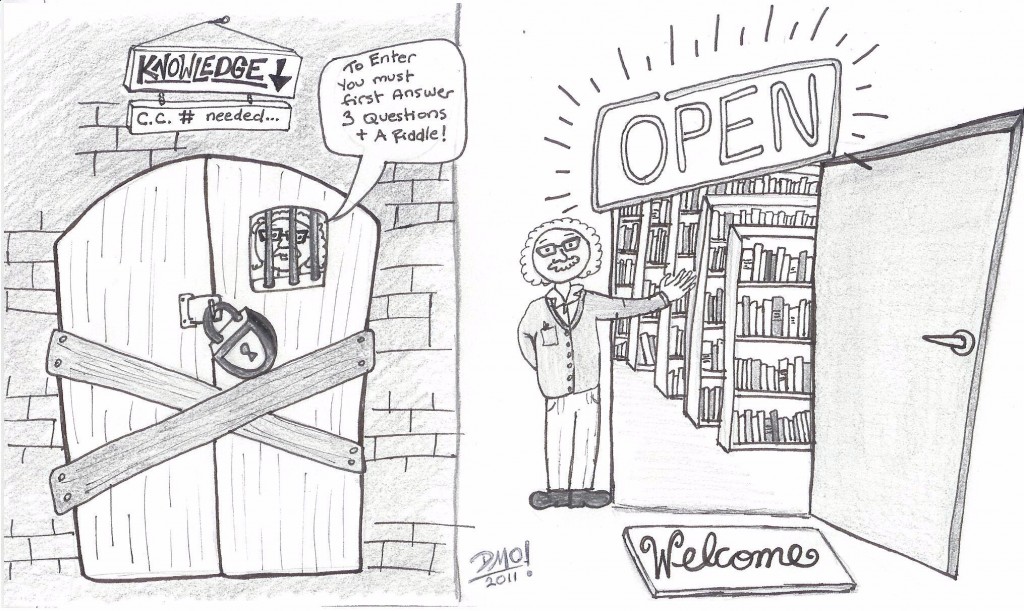Open access publishing is crucial for higher education to reach larger publics. MOOCs without strong content can’t draw decent audiences. And as much as we can love a charismatic sage-on-the-stage, decent higher education requires, well, doing the homework.
Our #FutureEd lunchtime discussion last Friday focused for a while on MOOC politics. Cathy Davidson’s Coursera experiment allows registered students access to the texts supporting the course, but students can’t link to them from elsewhere else (say, from a blog), and there’s no access to the readings after the MOOC is over. MOOCS vary in their degree of openness.
Coursera is a licensed xMOOC platform designed to extend higher ed by lowering costs of delivery and eventually developing a profitable business model. xMOOCs, mostly funded through venture captial now, anticipate income from student consumers, someday, somehow. xMOOCs license text books and library databases to registered Coursera students. Registered students provide a limited audience of readers with limited access to course readings – the articles, books, book chapters, film, and videos assigned. How far can higher ed extend if essential reading continues to be tightly regulated, locked behind paywalls? Not far.
cMOOCs (the 1st “c” is for “connectivist”) , on the other hand, involve open source, home-designed platforms that require no course registration. cMOOCs intend to extend peer-to-peer contact and learning without barriers. They are usually wholly accessible in every way without tiers or time-limits to content. cMOOCs have the greatest potential to extend higher education to new audiences. Open access scholarship is at the heart of this effort.
Last spring’s JustPublics@365 Participatory Open Online Course was an academic project close in shape and spirit to a cMOOC. Organizers wanted everybody engaged with the course Reassessing Inequality and Reimagining the 21st Century: East Harlem Focus — those with a CUNY affiliation or not, those who registered for course credit or not — to have free, complete access to the entire body of presentations, discussions, articles, books, and film. We also wanted the readings and videos to stay available for those coming along after the course finished, here. GC librarian colleague Shawn(ta) Smith performed the journal literature review; I covered the books and book chapters. Out of 117 assigned readings (film, articles, book chapters, books), 65% were either found or forged open online, at least for the duration of the course. 48% of those 117 are now in permanent, permissible open access contexts — in open access journals, posted on author websites, self-archived in institutional or subject repositories. Another small percentage of the 117 are posted on the open web in violation of publisher’s licensing agreements. These “rogue postings” are freely discoverable until a publisher decides to issue a take-down notice, as Elsevier did recently in response to articles authors self-archive on Academia.edu. 65% is pretty good, I guess, but open access work has got to become the norm, not the exception, for higher ed to reach new citizen audiences. For MOOCs to work, open access scholarship must work.
(Open Scholarship for Open Education: Building the JustPublics@365 POOC
a presentation by Shawn(ta) Smith, Polly Thistlethwaite, and Jessie Daniels)
Authors and librarians can work together to make scholarly work free and available to larger publics, without violating publishers’ contracts. Help yourself to our presentation on the topic, and watch this space for more.



